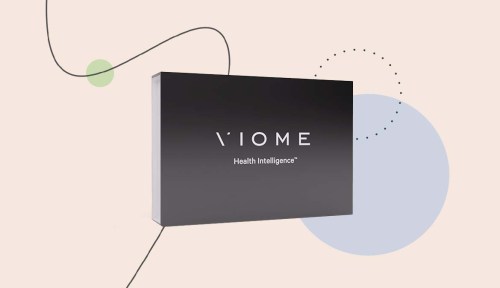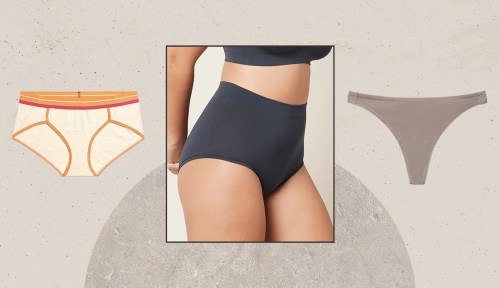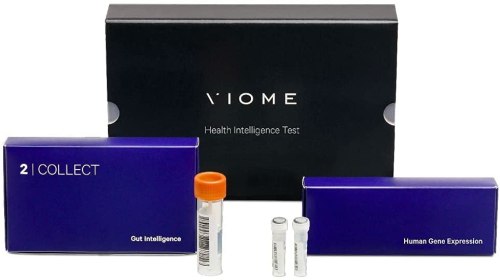Our editors independently select these products. Making a purchase through our links may earn Well+Good a commission
‘I Tried Viome’s $250 Health Intelligence Test—Here’s What It Taught Me About My Gut’
One health journalist tries Viome's Health Intelligence Test and shares her results, including what she learned about her overall health.

Nothing has impacted the health world in the past decade quite like the advances in gut health. I’ve been a journalist at Well+Good for five-plus years and have written more than 2,000 articles during this time; I can tell you first-hand that it’s almost impossible to talk about health without talking about the gut.
Experts in This Article
Grant Antoine, ND, is a translational science clinical expert at Viome, a a health testing company that uses artificial intelligence to analyze an individual’s gut biology to gain insights into their health.
Naveen Jain is the founder and CEO of Viome, a health testing company that uses artificial intelligence to analyze an individual’s gut biology to gain insights into their health.
Your gut affects digestion, sure, but it also affects your immune health and likelihood to feel anxious or depressed. Most serious is the connection between gut health and chronic diseases, including certain types of cancer and cognitive conditions such as Alzheimer’s. If I’ve learned anything while doing my job—and being able to call up leading medical experts and scientists has taught me a lot—it’s that knowing what’s going on in your gut is vastly important.
In an effort to practice what I preach, I decided to try Viome’s Health Intelligence Test ($250), which includes an analysis of the microbiome. The gut health company sells a kit solely focused on gut health for $100 cheaper, but the company reached out and offered me the deluxe version, which includes a blood test along with the stool test. This would give me not only a snapshot of my gut health, but my cellular health as well. (Every job has its perks. Mine happens to be getting to have my blood and poop analyzed for free.)
Viome Health Intelligence Kit — $250.00
Here’s how it works: You send samples of your blood and stool to Viome’s team of trained scientists. They analyze it and give you a set of scores related to your gut health, biological age, cellular functional health, immune health, energy levels, and stress response. Test-takers are also given tips for improving their scores by using a comprehensive list of foods to eat and avoid. You can also opt in for their supplements and probiotics, which are specially crafted for each individual based on their scores.
As someone with irritable bowel syndrome (IBS), I was especially interested to see if learning more about my gut could help me manage my symptoms better. Naveen Jain, the founder and CEO of Viome, believes it can. “We’ve published research showing that for people [with IBS] who actually follow [Viome]’s food and supplement recommendations, their clinical score of IBS went down by 40 percent,” Jain tells me. He also says that the test has also been shown to help with depression and anxiety, by 40 percent and 36 percent, respectively. Their next clinical trials are focusing on how effective following Viome’s personalized advice can help with chronic diseases, including certain types of cancer.
Jain also tells me that Viome’s business is booming. “COVID-19 has, of course, been such a dark time, but one positive that did come from it is that more people are taking control of their own health,” he says. “I really believe that the future of healthcare will be delivered not at the hospital, but at home.” Home tests certainly are easier than going to the hospital and I was more than willing to give it a shot.
What taking the Viome Health Intelligence test is like
When I got my kit in the mail, I felt pressured to make sure I collected my blood and stool samples correctly. The last thing I wanted was to have to send an email saying I didn’t collect my poop properly and needed to be sent a new kit—especially because they aren’t exactly cheap.
I decided to start with the blood collecting first. The kit comes with a lancing device, which pricks the finger and causes drops of blood to form. Once the blood drops start forming, you apply light pressure to your finger using your other hand and drip the blood into a test tube. This wasn’t easy for me. Even though I followed the directions of rubbing my hands together to warm my hands up, pricking my finger didn’t generate much blood. But eventually, I got just enough to fulfill the sample requirement.
Then came the stool sample. For this, the kit comes with what’s essentially a paper basket that hooks to the sides of the toilet. Then, you do your business as normal and the poop is caught on the paper. Using a tiny shovel, you take a piece of the stool and put it into a little test tube, which has liquid in it. Then, you shake it all up. Honestly, the poop part wasn’t that hard. I did wonder if my mail carrier knew what I’d be sending through the mail. With that thought, I put my test tubes of blood and stool in the provided envelope and shipped them off to be analyzed by Viome’s team of experts.
The results are in
I had to wait a long time for my test results. After two months, I reached out to my contact asking if they could speed things up. She apologized, saying demand for the kits had spiked during the pandemic and that the company had recently switched labs, which caused a bit of a delay. But a couple weeks later, my results were finally in.
Given that I have IBS and do experience a lot of gut health issues, I was not expecting my scores to be stellar. On the other hand, I do eat relatively healthy, following a plant-based diet—so that had to count for something, right? In terms of my cellular health scores, I really had no idea what to expect there.
My test results came with good news and bad news. My biological age, according to the test, is 25—a full decade younger than I actually am. This means that at a cellular level, my cells are aging slower than most people my age. My immune system health is also in good shape, with a score of 66 out of 100. (While this may be a “D” on a report card, Viome’s scale indicates that it’s in the optimal range.) My stress response is 70 out of 100, also in what Viome indicates is “optimal.” This means my body is responding well to environmental toxins, free radicals, and lifestyle-related stress. I did take ashwagandha and reishi every day to help my body fight off stress—maybe that’s a reason why.
That’s where the good news ended. My mitochondrial health (which assesses the efficiency of how well the mitochondria is meeting the body’s energy and metabolic demands) is in the not optimal range, at 24. “If your mitochondrial health score is not optimal, it could mean that your cells are not receiving enough energy to function properly,” the results tell me, adding this can affect both brain and heart health.

Then came my overall gut health score, only 37 out of 100—yikes. “When this score is low, it means that your gut microbiome may be producing chemicals that are causing inflammation or not producing enough nutrients that your body needs,” the results read. Looking at my other gut health scores, the problem became apparent; I have a protein fermentation score of 71, and this is one score where it’s best to clock in with a low number, not a high one. “This score reflects whether or not you are digesting your proteins properly,” the results read. “If the protein is not fully broken down through this process, your microbes will digest the excess protein available and may convert it into harmful byproducts.” My other gut health scores (related to inflammation activity, gas production, digestive efficiency, and gut lining health—to name a few) were all average.
Wanting more details, I hopped on a Zoom call with Jain and Grant Antoine, ND, a clinical translational scientist at Viome. Dr. Antoine tells me that one major issue in terms of my gut health is this: too much bad bacteria and not enough good bacteria. One way to change this, he says, is to eat a wider range of nutrient-rich foods; the gut loves diversity. Jain says he can tell by looking at the specific types of bacteria strains from my stool test that there are two other reasons why my gut health score is so low. One is past antibiotic use. Two is because of alcohol use. I was impressed he could tell this just by looking at my test. He’s right: Two years ago I took antibiotics because I was sick (clearly my gut still hasn’t recovered) and I do tend to have a glass of wine most nights.
“The good news is that your gut lining is strong [as the gut lining health score shows],” Jain tells me, saying that this means the problems in my gut have been confined there and aren’t spilling over into other areas of my body. This makes sense since my immune health and biological age scores are actually good. “But it’s a ticking time bomb,” Jain goes on to say. “If the problems in your gut aren’t fixed, it will cause more problems down the road.” Yikes.
“You have this time bomb in your gut, but it’s important to have that knowledge now because you can decide how to want to manage that risk,” Dr. Antoine says. “What we can see is that in your gut, there is a high level of LPS [lipopolysaccharide], a chemical linked to causing inflammation. If it crosses through your gut lining, it can predisposition you to chronic diseases.”
Watch the video below for more intel on how food can affect gut health:
How learning about my gut and cellular health is affecting my food and lifestyle habits now
Jain and Dr. Antoine tell me it’s not too late to improve my gut health score; it absolutely can be done. They (not surprisingly) recommend following the dietary advice from Viome’s nutrition panel. Looking at my list of foods to eat and avoid, it honestly shouldn’t be that hard; the list of foods I can eat is vast—even for someone who prefers not to eat a lot of animal products, like me. I also have to cut back on the alcohol—no way around that one.
One surprise I did find looking at the list was that it recommended I minimize my soy intake. Soy is something I eat every day either in the form of tofu or in the animal substitution products I buy. It tends to be the first ingredient listed on plant-based beef, chicken, and even vegan fish. If I wanted to maintain a plant-based lifestyle while improving my gut, I would have to rely less on these type of products and buy foods like lentils, black beans, and chickpeas for my protein instead.
One downfall of Viome’s nutrition advice is that the test cannot pick up on food sensitivities or intolerances, so that is not taken into account. For example, I have a very strong lactose sensitivity and am also sensitive to eggs, but my food list advised I eat both dairy and eggs. Jain says the company is working on a new iteration of the test using biomarkers and breath analysis that will hopefully be able to detect allergies and sensitivities. But for now, you just have to be mindful of your own dietary restrictions and take that into account when reading the food list.
Since following the nutritional advice still allows me plenty to eat, I’m committed to seeing it through. I also decided to buy the supplements and probiotics Viome recommended to me. “The supplements include vitamins, minerals, food extracts, amino acids, and digestive enzymes that were individually designed for you,” Jain says. “If you want, you can buy them somewhere else. Or, we actually make the capsules just for you on demand.” Ditto, he says, when it comes to the probiotics. The price of the supplements and probiotics is $150 a month with $76 off the first order. It’s a commitment that certainly isn’t cheap—and unlike with the kit, I’m not getting a special journalist discount this time. But I rationalize that if I don’t invest in improving my gut health now, I’ll be paying for it in more expensive ways down the road.
Besides, I can literally test the advice by taking the test again in six months—something I definitely plan on doing. Doctors, dietitians, and other experts preach on a regular basis that we can directly affect our health through what we eat. Retaking Viome’s test (after committing to the nutritional advice and supplements) is a way to find out just how true that is. I have a gut feeling it will work.
Oh hi! You look like someone who loves free workouts, discounts for cutting-edge wellness brands, and exclusive Well+Good content. Sign up for Well+, our online community of wellness insiders, and unlock your rewards instantly.
Sign up for the Well+Good SHOP Newsletter
Get exclusive deals on wellness, beauty, fitness, and food products that have been hand-picked by our editors.
Got it, you've been added to our email list.








